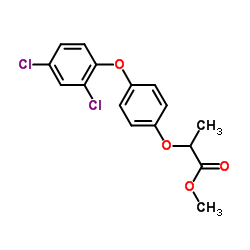Environmental effects of inclusion complexation between methylated beta-cyclodextrin and diclofop-methyl.
Xiyun Cai, Weiping Liu, Shengwen Chen
文献索引:J. Agric. Food Chem. 53(17) , 6744-9, (2005)
全文:HTML全文
摘要
Diclofop-methyl (DM) is a broad-spectrum herbicide but often shows a reduced biological activity against the target grasses due to its poor water solubility and slow translocation within plant tissues. Randomly methylated beta-cyclodextrin (MCD) is an effective inclusion complexation agent and, as a potential formulation additive, may thus improve the behavior of DM. We evaluated the complexing role of MCD by measuring the solubility and soil sorption of DM as a function of MCD concentration, as well as the dissolution rates of DM-MCD complexes. The complex was also extensively characterized by UV, fluorescence, Fourier transform infrared, nuclear magnetic resonance, and differential scanning calorimetry techniques. The apparent solubility of DM linearly increased with MCD concentration, indicating the formation of a 1:1 complex. In contrast, diclofop was not complexed by MCD. The DM-MCD complex appeared to have formed within the hydrophobic cavity of MCD. With the measured stability constant of 4740 L mol(-)(1), the complex was apparently stable, which resulted in DM resistant to hydrolysis, and hence the ratio of DM to the sum of DM and diclofop increased toward unity with increasing MCD concentration. The DM-MCD complex also quickly dissolved to a maximum within 5 min, due presumably to the hydrophilicity of MCD. The sorption of DM by soil was significantly reduced in the presence of MCD. All the results suggest that MCD may effectively improve the availability of DM to pests and for bioremediation.
相关化合物
| 结构式 | 名称/CAS号 | 分子式 | 全部文献 |
|---|---|---|---|
 |
禾草灵
CAS:51338-27-3 |
C16H14Cl2O4 |
|
Characterisation of target-site resistance to ACCase-inhibit...
2003-02-01 [Pest Manag. Sci. 59(2) , 190-201, (2003)] |
|
Genetic control of a cytochrome P450 metabolism-based herbic...
2011-05-01 [Heredity (Edinb.) 106(5) , 817-24, (2011)] |
|
Recurrent selection with reduced herbicide rates results in ...
2005-04-01 [Theor. Appl. Genet. 110(6) , 1154-66, (2005)] |
|
Time-dependent degradation and toxicity of diclofop-methyl i...
2009-06-01 [Environ. Sci. Pollut. Res. Int. 16(4) , 459-65, (2009)] |
|
Relation of diclofop-methyl toxicity and degradation in alga...
2007-05-01 [Environ. Toxicol. Chem. 26(5) , 970-5, (2007)] |